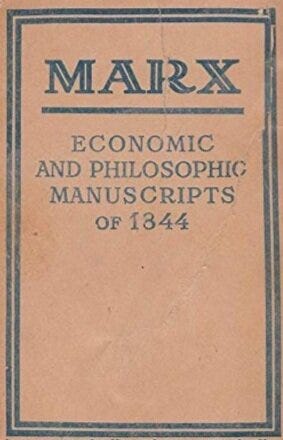One of Marx’s major critiques of capitalism isn’t that it is motivated by avarice and greed but rather because it is alienating. His work is informed by the conditions of the 19th century textile or mine worker, but remains pertinent to the service industry or white collar worker today. He got his notion of alienation from Hegel, who described an unhappy consciousness divided against itself, separated from its essence, which it has placed in a beyond. It is this extra distance that creates alienation. “Therefore, alienation is a lack of self-worth, the absence of meaning in one's life, consequent to being coerced to lead a life without opportunity for self-fulfillment, without the opportunity to become actualized, to become one's self.”
QUESTION: what is the nature of this alienation and what are its consequences?
ANSWER: It is characterized by a certain lack of authenticity. Divided from our true nature, alienation is more than just a psychological phenomena. It is a metaphysical state that is supposed to belong together that is instead torn apart. There is a lot of suffering, but not all suffering shows up on the level of self understanding of the person. E.g. someone could be neurotic but could still be happy. It's a metaphysical state that is a cause for a multiplicity of suffering.
QUESTION: how would these Hegelians respond to Ernest Becker’s critique that it is precisely because the death of these “Beyonds” that man has sunken into a shared cultural neuroses. We truly are biased by the limited data presented in our times.
ANSWER: He would say that transcendence has disappeared is a ridiculous conclusion. They would say death of religion is only a perceptual phenomena. We are actually being involved in more beyonds and that is the cause of our cultural neuroses.
Alienation from the Product
The product is alienated from the worker because:
The product doesn’t belong to the worker but rather the capitalist.
The products aren’t meant to satisfy the workers desire.
There is a more subtle point that the worker produces their own means of oppression. The very goods they create we’ve become dependent upon and seduces the consumer, the system perpetuates itself.
Alienation from Process
The worker is alienated from the production process because, the division labor has deskilled the worker so much that he ends up doing the one same motion on the conveyer belt over and over. The work is tedious, repetitive, and boring.
Alienation from Species being
Marx believed that animals can only labor for themselves and their immediate needs. Humans on the other hand can plan and labor for others. Free production — to determine, plan, and execute a series of productive actions — is vital to our species being (human nature).
The deskilling of the workers means that he no longer gets to plan in the long term, he merely follows orders that lead to god knows where. He is experiencing unfree production.
Alienation from Each Other
Our connections with others are systematically severed by capitalism because:
The division of labor made our work much more isolated.
We are pitted to compete against each other.
Alienation in Modernity
A fruitful discussion arises to how much the service industry or white collar worker of the 21st century is still affected by these forces.
I think currently alienation is necessary: since society is so complex we necessarily have to abstract, work our own specialized fields and interact with experts of their own fields. I wonder how much alienation can be attributed to capitalism and not just progress. That is to say, alienation today seems to result less from the economic force of the division of labor but rather the epistemic limitations of our minds to comprehend complexity.
Miscellaneous
Marx’s early works weren’t unveiled until the 20th century when marxism already proliferated. A lot of what we conceive of Marx is in Kapital rather than these earlier works.
Marx always conceived of himself as someone who would aspire political action: ”philosophers have only interpreted the world in many ways, the points however is to change it.”




